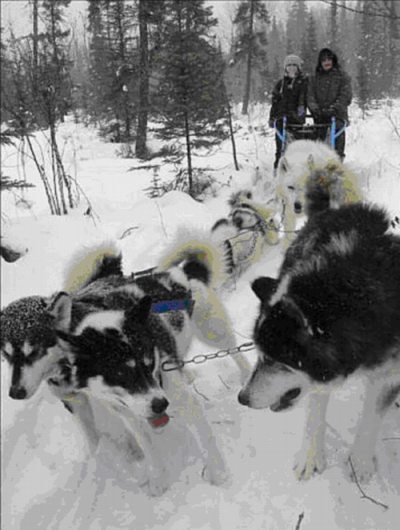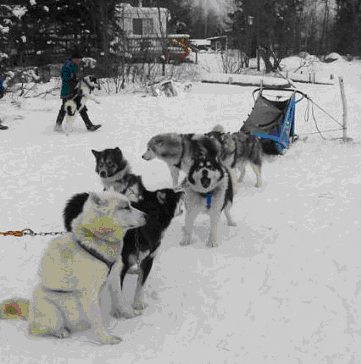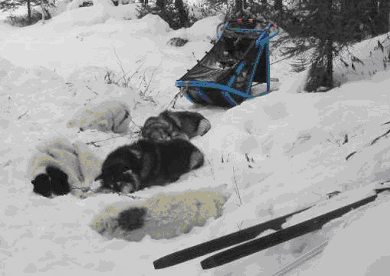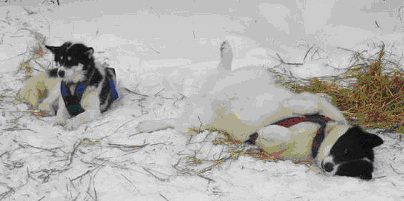Additional photos by Rachel Heineman
Herb’s article and photos appeared in the February, 2010, issue of The Lumberton Campus Chronicle
Three months ago the only knowledge I had of dogsledding was the Iditarod and polar exploration; I didn’t realize one did it purely for recreation. Then Maggie announced that she would go dogsledding with our daughter Lisa—a mother-daughter vacation. Intrigued by the idea, I decided to go with our NYC grandchildren. Only Rachel was available, so it was just the two of us. Rachel is 14.
Ely (short “y” like nearly), MN, some 250 miles north of Minneapolis, touts itself as the country’s dogsledding capital. The economy of that small town revolves around outdoor sports. Frigid winters make for skiing, snowmobiling, and dogsledding. In summers canoes ply the countless lakes and waterways collectively referred to as the Boundary Waters. In January of this year Ely enjoyed a spell of cold in the range of 30-35 degrees below zero. Luckily for us Easterners, our visit found all temperatures above zero, although single-digit readings greeted us the first night. Hardy vacationers (all of them youth) slept outdoors. One boy was forced back in early because he lost his cap in the dark.
Clothing is everything. We were taught the three Ws: wicking (to suck the sweat away from your skin), warmth, and wind resistance. Each requires a separate layer designed for its special function, but there’s no rule against extra layers. Layers trap air, and that’s good insulation. Many people don’t even own the proper kind of clothes, so the outfitters sell or rent them to visitors.
Our drill included tending the dogs—feeding, watering, and scooping—before breakfast. The pens are a cacophony of canine vocalization. Forty or sixty dogs awaiting food, and the activity to follow, can be mighty boisterous. Even when they’re harnessed they don’t let up; on the contrary, they become louder and frequently howl (“sing” in local lingo) in chorus. They work hard and they know how to relax. It’s not unusual to see one rolling in the snow when the team is stopped.
Looking somewhat like small wolves, these Canadian Eskimos (or Inuits) look and sound frightening, but they love to be petted even by total strangers. In fact, they’re so lovable, it’s hard not to give them hugs anytime there’s a pause in activity.
To the people who own and work with these dogs, they are family, and the mutual affection is palpable.
Sleds come in different sizes and shapes. In our case they were for either one or two sledders. In all cases the sledders stand holding on to a bar, shout commands, and work a footbrake to stop the sled from running downhill over the dogs. Our teams had either five or three dogs, harnessed to each other as well as to the sled.
Canadian Eskimos, and their relatives Siberian Huskies, have been described as “born to pull.” It appears to be in their genes that they’re happiest when pulling a load, hence their vociferous impatience when they’re being harnessed.
The experience of being pulled across a frozen lake or along a trail in the woods must be experienced to be appreciated. In a word, it’s exhilarating. Properly dressed you hardly feel the cold. There’s plenty of time to drink in the scenery because the dogs follow whoever is ahead. And the scenery is gorgeous. Whether you’re looking at the evergreens across the pristine-white lake or close up with puffballs of snow hanging from their branches, the totality is what Rachel called “a winter wonderland.”
And the dogs were quiet while they were pulling, their most ardent wish satisfied.
My longest ride was nine miles.
Wintergreen Dogsled Lodge is operated by Paul Schurke, who has led expeditions to many places, including the North Pole, and has made a USSR-approved crossing of the Bering Sea from Siberia to Alaska to help reestablish communications among the Eskimos—of common ancestry—living on both sides. On a wall in the lodge hang letters of congratulation from Presidents Reagan and George H. W. Bush and a photograph of Paul and his USSR counterpart meeting with Mikhail Gorbachev.
Below: photos and captions by Rachel Heineman



